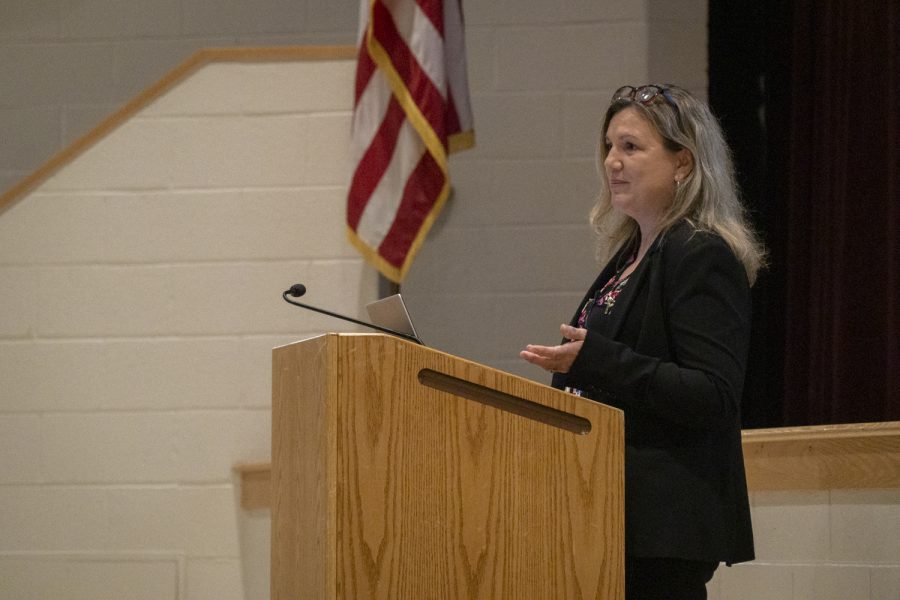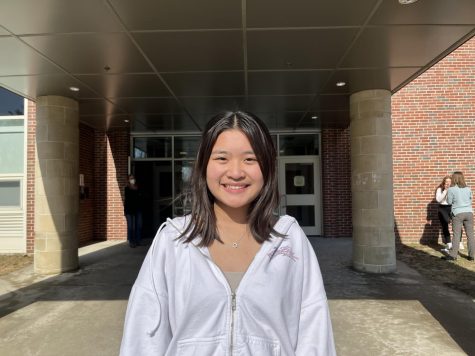Survivor of Bosnian genocide shares experiences, story of survival
Bosnian genocide survivor Jasmina Dervisevic-Cesic speaks to the junior class about her experiences living through a genocide and about the importance of sharing your experiences with others.
June 14, 2023
Bosnian genocide survivor Jasmina Dervisevic-Cesic spoke to the junior class on June 7 and shared her experiences living in Visegrad, seeing the horrors of her family and friends killed, and the importance of sharing your story, helping strangers, and respecting your parents and friends.
Cesic grew up in her hometown of Visegrad, Yugoslavia which was in central Eastern Europe until the country disbanded in 1992. Yugoslavia was composed of six republics: Slovenia, Croatia, Bosnia and Herzegovina, Montenegro, Serbia, and Macedonia. Cesic recounted her early childhood memories of swimming in the rivers, playing sports, going to school and parties. Cesic graduated from high school in 1991, less than a year before the war broke out in Yugoslavia.
In April of 1992, the Serbians, supported by the Yugoslav National Army, attacked Visegrad, a town next to the border of Serbia, and Cesic had to escape.
“At our last summer mini Olympics, this is where I saw the first signs of the war,” Cesic said. “For the first time, the Yugoslavian flag was replaced by the Serbian flag that was used 100 years ago. We heard songs that the Chetniks, Serbian Nationalists, played during WWⅡ. While our friends on the [swim] team that were Serbs were not offended by that, we Muslims were very scared.”
Cesic shared that her high school homeroom teacher was the mastermind behind all of the killings in her hometown, Visegrad. He did not let Cesic’s class leave Yugoslavia for their senior class trip because he was preparing for war. To this day, he is still at large.
Cesic and her family tried to live a normal life, despite everything that was going on in their area. She learned the importance of cherishing every moment with her family and friends.
“Every time we had a free moment, we would meet in a cafe and pretend that the war was not going on and nothing bad was happening around us,” Cesic said. “We were just trying to live in the moment because we didn’t know how long we had and if it would be the last minute of our life.”
Cesic’s marriage to her first husband only lasted 3 months before they were victims of a terrible attack while they were waiting at a bus stop.
“A grenade fell next to us and Suljo [Cesic’s husband] was blown in half while we were holding hands,” Cesic said. “I was badly wounded and I lost my right arm. More than 30 people that were standing there at the bus stop were very badly wounded and four of them, including Suljo, were killed just from one grenade.”
When Cesic was in the hospital following the grenade explosion at the bus stop, her doctor, Ismet Gavrankapetanovic told her some shocking news.
“[Dr. Ismet Gavrankapetanovic] told me that I was dead for a few minutes and I didn’t even know it,” Cesic said. “When I woke up in the emergency room, he was the first one I saw. To call someone ‘father’ in Bosnia, it’s called ‘Babo.’ So, when I saw his face, he said to me: ‘Jasmina, I am your Babo.’ He became my second Babo.”
Cesic also described how hard it was to lose her oldest brother, Tajib, in the war. Tajib decided to leave Sarajevo to try to get closer to their hometown to free their father from the concentration camp, but was killed as a result.
“[Tajib] was my heart and soul,” Cesic said. “When I was in the hospital during the war, he was beside my bed all the time and he was the reason why I probably had the strength to go on and survive.”
Cesic’s father, Nurko Dervisevic, was one of ten to have survived the concentration camp in their hometown. In 2009, he was told to testify as a witness against war criminal Milan Lukic, who is now serving a life sentence in Estonia.
“We were watching my father testify and it was one of the hardest sentences I’ve ever heard,” Cesic said. “It broke my heart. My father looked into Milan Lukic’s eyes and said: ‘I would forgive you of everything if you would just tell me where are the remains of my son.’”
During the Bosnian Genocide, the United Nations had six “safe areas” that were supposed to provide humanitarian relief for the people. However, almost each of the areas fell to the Serbians and were ethnically cleansed. In Srebrenica, a small town in Bosnia and Herzegovina, more than 8,000 people were killed within a few days.
“NATO could not provide protection,” Cesic said. “They claimed that the application [for peace support] was not filled out correctly so there was no help from the international community.”
The Bosnian genocide’s memory has been erased by the Serbians who witnessed the war. The event, “3,000 roses for 3,000 victims” occurs every year on the historic Mehmed Pasa Sokolovic bridge in Visegrad sometime between the end of May to the beginning of June where 3,000 roses are thrown into the river for the 3,000 victims of the Visegrad massacres.
“No Serbian has ever come to the bridge to honor the victims even 30 years after the war,” Cesic said. “That’s called ‘genocide denial.’”
In 1993, Cesic was the first Bosnian refugee to come to the United States. Cesic read a passage from her 2003 memoir The River Runs Salt, Runs Sweet: A Memoir of Visegrad, Bosnia to the audience.
“Some people have asked me about forgiveness,” Cesic said. “When will I be able to forgive the Serbs? I lost so much. I lost two brothers I loved dearly. I was still a newlywed when I lost my husband, unborn baby, right arm…I am angry. In some ways, forgiveness is the wrong thing to ask me…Do I want revenge? No. I also don’t want war crimes to go unpunished…We must not dwell on the past, but we must protect the future. There must be justice without revenge. And there must be healing…We are here to help each other, not just the people who are like us, but the people who we find on our doorstep in need, whoever they are.”
Cesic lives by former President Kennedy’s quote: “Ask not what your country can do for you – ask what you can do for your country.” She is a proud wife and mother and stays active in her community through humanitarian work, helping children and organizing events with the New England Friends of Bosnia and Herzegovina organization.
Cesic left the audience with an important message.
“I would ask you first that it’s very important to respect your parents,” Cesic said. “You should share your stories with your parents, whatever is going on in your life. Parents are your best friends. And then, share with your friends and be kind to your friends and anyone else.”
To learn more about the Bosnian Genocide, visit Remembering Srebrenica.










